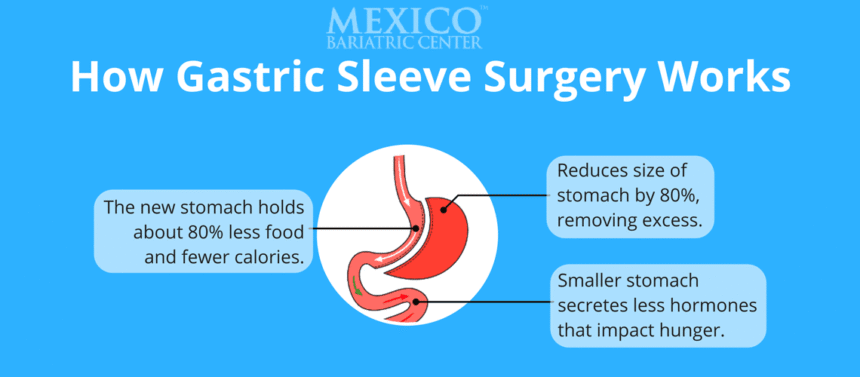Gastric sleeve surgery is a life-changing procedure designed to help individuals struggling with obesity achieve significant and sustainable weight loss. While the goal is to improve overall health, some patients worry about losing too much weight after surgery.
Can you get too skinny after a gastric sleeve? The short answer is yes, and excessive weight loss can lead to serious health concerns. This article will explore the potential causes, risks, and solutions for preventing unhealthy weight loss after gastric sleeve surgery.
What Is Considered “Too Skinny” After Gastric Sleeve?
Healthy weight loss should bring you within a normal Body Mass Index (BMI) range (18.5–24.9). If your BMI drops below 18.5, you may be considered underweight, which can lead to various health complications.
Symptoms of being too skinny include:
- Extreme fatigue
- Visible muscle loss
- Weak immune function
- Brittle hair and nails
- Nutrient deficiencies
Causes of Excessive Weight Loss After Gastric Sleeve
Some people lose too much weight after gastric sleeve surgery due to:
- Poor Nutritional Intake: Eating too little or avoiding nutrient-rich foods.
- Post-Surgery Complications: Nausea, vomiting, and difficulty tolerating food.
- Psychological Factors: Fear of weight regain leading to restrictive eating habits.
- Increased Metabolism: Rapid calorie burning due to an extreme calorie deficit.
Signs and Symptoms of Excessive Weight Loss
If you notice any of the following symptoms, you may be losing too much weight:
- Chronic fatigue and weakness
- Dizziness and lightheadedness
- Hair thinning or hair loss
- Frequent illnesses due to a weakened immune system
- Muscle wasting and frailty
Health Risks of Becoming Too Skinny After Surgery
Losing too much weight after Turkey gastric sleeve surgery can lead to severe health complications. While the procedure is designed to help individuals shed excess pounds and improve overall well-being, excessive weight loss can create new health problems. Below are the key risks associated with becoming too skinny after gastric sleeve surgery:
Malnutrition and Vitamin Deficiencies
Your body requires essential nutrients such as protein, healthy fats, vitamins, and minerals to function properly. When weight loss is excessive, you may struggle to meet your daily nutritional needs, leading to deficiencies in:
- Vitamin B12: Essential for nerve function and red blood cell production. A deficiency can cause fatigue, memory problems, and nerve damage.
- Iron: Low iron levels can lead to anemia, which causes weakness, dizziness, and shortness of breath.
- Calcium and Vitamin D are crucial for bone health. A deficiency can increase the risk of osteoporosis and fractures.
Bone Loss and Osteoporosis
Extreme weight loss can reduce bone density, making bones more fragile and prone to fractures. Without adequate calcium and vitamin D, you may develop osteopenia (low bone mass) or osteoporosis, increasing the likelihood of serious injuries.
Heart Issues and Low Blood Pressure
A lack of essential nutrients can weaken the heart muscle, leading to complications such as:
- Bradycardia (slow heart rate) can cause fatigue, dizziness, and fainting.
- Low blood pressure: This may lead to lightheadedness and an increased risk of falls.
Digestive Issues and Gastrointestinal Problems
Severe weight loss can lead to problems such as:
- Chronic constipation or diarrhea due to inadequate fibre intake.
- Bloating and gas caused by an imbalanced diet.
- Difficulty digesting food, leading to discomfort and nutrient malabsorption.
How to Prevent Becoming Too Skinny
Adopting sustainable eating and lifestyle habits is essential to maintain a healthy weight after gastric sleeve surgery. Here are some key strategies to prevent excessive weight loss:
Follow a Structured Post-Surgery Diet Plan
Your diet should be carefully planned to ensure you get enough calories and nutrients. Work with a registered dietitian to create a balanced meal plan that includes:
- Protein-rich foods (chicken, fish, eggs, tofu, legumes) to prevent muscle loss.
- Healthy fats (avocado, nuts, olive oil) provide energy and support overall health.
- Complex carbohydrates (quinoa, sweet potatoes, whole grains) for sustained energy.
Eat Small, Frequent Meals
Since your stomach size is smaller, large meals can be uncomfortable. Instead, aim for 5–6 small meals daily to ensure you consume enough calories. Choose nutrient-dense foods instead of empty calories.
Track Your Calorie and Protein Intake
After gastric sleeve surgery, you must be mindful of your calorie intake to avoid excessive weight loss. Here are some guidelines:
- Daily calorie intake: Aim for at least 1,200–1,500 calories per day (or more, depending on your needs).
- Protein goal: Consume at least 60–80 grams of protein per day to preserve muscle mass.
- Use a food tracker: Apps like MyFitnessPal can help you monitor your intake.
Manage Food Aversions and Digestive Issues
Many gastric sleeve patients experience food aversions or intolerance to certain foods. If you struggle with nausea, bloating, or loss of appetite:
- Introduce new foods gradually to find what works for your digestive system.
- Try smoothies or protein shakes if solid foods are difficult to tolerate.
- Avoid overly restrictive eating habits that may prevent adequate calorie intake.
While gastric sleeve surgery is highly effective for weight loss, there is such a thing as losing too much weight. Achieving and maintaining a balanced weight should be the goal, not just getting as slim as possible. If you’re experiencing excessive weight loss, don’t hesitate to seek medical guidance to ensure your long-term health and well-being.
By focusing on proper nutrition, strength training, and a balanced mindset, you can maintain a healthy weight and enjoy the benefits of your gastric sleeve surgery without the risk of becoming too skinny.
Ready to take the first step towards a healthier, happier you? Explore Turkey’s top hospitals with Flymedi for gastric sleeve surgery and transform your life with expert care at an affordable price. Book a free consultation today and start your weight loss journey!


